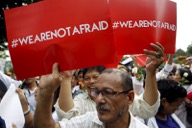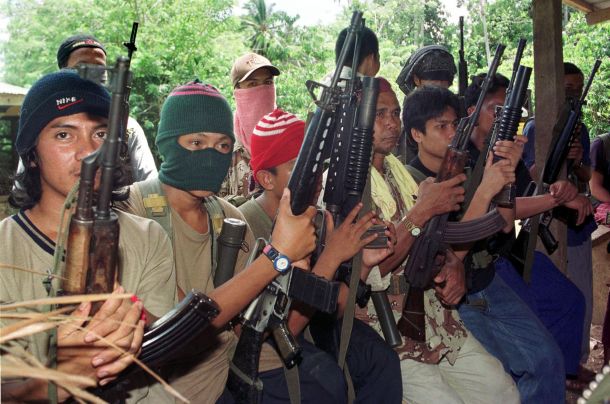By Jamie Matthews

On October 17 2017, Philippine President Duterte declared that the city of Marawi had been ‘liberated from terrorist influence‘. The city, located on the southern Philippine island of Mindanao, had been under siege by militant groups fighting under the flag of the so-called Islamic State (IS). While the Government’s victory is a welcome success, the five-month siege exposed the vulnerability of the Philippines to the continued threat of jihadist extremism.
Islamic State’s Pivot to Asia
The battle for Marawi represents the escalation of Islamist militancy in the Philippines and, more broadly, in South East Asia (SEA). The island of Mindanao has a history of Islamic separatism, with both peaceful and violent attempts to gain autonomy. However, the more violent elements of the movement have been given a boost by recent global changes. The most obvious change has been the rise of IS, which has attracted a growing number of Muslims to the creation of an Islamic caliphate. While IS has lost ground in Syria and Iraq, the group has sought to extend its influence elsewhere. This change has involved encouraging terrorism in the West, and the establishment of wilyats (IS provinces) in regions such as SEA and North Africa. With a sizeable Muslim minority often living in harsh poverty, the Philippines provides a particularly attractive target for the formation of a wilyat. The attack on Marawi therefore represented the beginning of IS’s ‘pivot to Asia’, meaning the actions of extremists in Marawi was part of a long-term strategic goal of IS. The threat of further attacks across the Philippines and SEA is high.
Impact of the Marawi Siege
Despite the militants’ eventual defeat in Marawi, the conflict has heightened the risk from extremist groups inspired by IS. Over five months, a small number of militants resisted government forces and controlled large parts of the city. At one point, it is thought that as few as 70 militants were keeping some 7000 troops at bay. The effectiveness of such a small number of dedicated fighters emboldened IS over the strategic potential of occupation in Mindanao. Some security analysts even believe that IS won the battle strategically because they showed their ability to resist powerful military forces. Success during the battle for Marawi has provided Islamists with a martyrdom to inspire others.
The siege also assisted the radicalisation of young Muslims in the region and attracted extremists from around the world to the cause in Mindanao. The attack was well-documented in the media and IS publications. Images of militants raising black IS flags across Marawi were broadcast across the world and are thought to have had a similar impact as the images of IS’s 2014 victory in Mosul. The heavy-handed and ineffective approach of the Philippine military further aided the recruitment of young Muslims into IS ranks. IS recruiters utilised the Philippine military’s reliance on airstrikes to claim that it was the Government that destroyed the city and its residents’ homes. These publications by IS were made in conjunction with information on the historic plight of Muslims in Mindanao, highlighting previous governments’ attempts to oust Muslims from the region. These messages have encouraged radicalised Muslims to sympathise with the cause in Mindanao. The Island has even been described as “the new land of jihad”.
In the aftermath of the siege, the risk of Islamist extremism remains high. Civilians in Mindanao are growing increasingly wary that the militants will regroup and overrun surrounding rural areas and towns. The likelihood of lone-wolf terrorist attacks has led some Christian groups in Mindanao to arm themselves. The arming of Christians against Islamists is particularly worrying because previous rounds of sectarian violence in the Philippines began in a similar manner. President Duterte is aware of the severity of the danger, shown by the recent extension of martial law in Mindanao until the end of 2018. This extreme course of action taken by Duterte, and ratified by the Congress in Manila, demonstrates the difficulty of providing security and rule of law in a region which is extremely vulnerable to civil unrest.
Future Policy
The threat of Islamist extremism is clearly ongoing and serious in the Philippines. There are numerous ways in which the Philippine Government can mitigate these risks. Firstly, investment is required to rebuild the city of Marawi. Failing to do so would heighten poverty and resentment towards the government. Such conditions would prove fertile for the radicalisation of young Muslims by IS propaganda. Secondly, sufficient intelligence and policing resources are required to track down and capture extremists. This is particularly important given recent accusations that Duterte has not dedicated enough time, energy and money into countering Islamist extremism. Instead, he has been accused of diverting precious military and policing resources to his infamous war on drugs. Finally, the Philippines should take a more collective approach to countering extremism alongside their South East Asian neighbours. Tighter security checks on movement between borders and improved intelligence sharing would prove particularly helpful. The threat from IS in SEA is becoming increasingly apparent which should encourage cooperation between states. The Philippines, Indonesia and Malaysia have already demonstrated over the past year their willingness to tackle the threat collectively with joint military and security operations. Further collective action is required if they wish to stem the surging tide of Islamist extremism across the region.
Jamie is a postgraduate reading Intelligence and International Security at King’s College London. He has a degree in Politics and International Studies as Warwick University. He is interested in a wide range of international and domestic security issues including the rise of Islamist extremism, the use of drones for targeted killing and intelligence related issues.
Image Source:
http://i.dailymail.co.uk/i/pix/2017/05/25/09/40C5C47900000578-0-image-a-25_1495700147350.jpg


